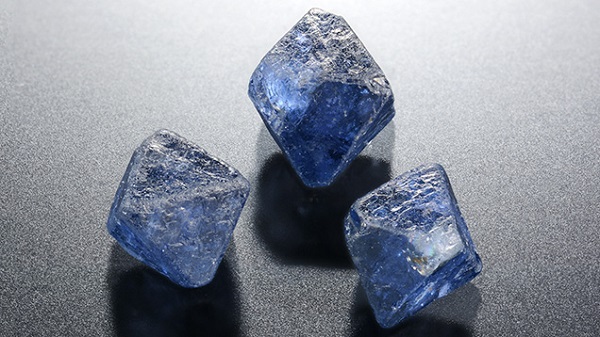
Nigeria is endowed with over 34 commercially viable solid minerals across her landscape. From 1903, the country has been involved in the exploration and exploitation of some of these minerals, until independence in 1960.
Some of the minerals exploited during this period include tin, columbite and coal – all of which contributed to economic development.
Speaking during a recent media interaction with journalists, the Minister of Mines and Steel Development, Arc. Olamilekan Adegbite posited that the global demand for mineral commodities has been on the increase.
He noted that the increasing interest of the government in solid minerals development is to take advantage of the increase in international commodity prices and the global resurgence of exploration activities, coupled with potential benefits to the economy. To promote the development of this sector, several strategies and policies have been put in place.
Among these is the establishment of the Mines and Steel Development Ministry in 1985 to formulate policy, provide information on mining potential and production, regulate operations and generate revenue for the government. The activities of the ministry led to the creation of the National Policy on Solid Mineral development, 1998; the enactment of the Minerals and Mining Act of 1999, the development of the seven-year Strategic Action Plan for Solid mineral development in Nigeria (2002, 2009), the establishment of the Nigerian Geological Survey Agency, the establishment of sustainable management of Mineral Resources Project (a World Bank-assisted programme), the establishment of the Mines Environment Compliance Department to ensure best international practices and the establishment of artisanal and small-scale mining department as a focused department for small entrepreneurs and local content.
The minister averred that these interventions are put in place to enable the nation to achieve sustainable increase in the solid minerals sector’s contribution to GDP, generate quality geoscientific data, establish a transparent licensing regime, formalise artisanal and small-scale mining operations, eradication of poverty, generation of employment, create wealth through value addition and to increase the capacity of the sector to attract private investment capital. Despite these, the qualities and quantities of most of the locally available minerals have not been properly documented.
Recall that the Federal Government, through the Ministry of Mines and Steel Development, re-launched the Solid Minerals Policy Roadmap in September 2016. This aimed at ensuring policy continuity and consistency in the sector. The assiduous efforts of the government may have started yielding results.
Adegbite disclosed that in 2022 advanced exploration and mining for gold, silver and lead commenced in Baba Tsauni, Gwagwalada in the Federal Capital Territory. Also, he hinted that Segilola Resources Operating Limited (SROL), a West African subsidiary of Thor Exploration Limited has paid N1.1 billion in royalties to the Federal Government since it started the exploration and development of gold in 2021.
The minister noted that the earlier hesitation of foreign interest in the sector changed with accelerated investment in exploration through the National Integrated Mining Exploration Project (NIMET) and its generated data.
At its inception, the Raw Materials Research and Development Council (RMRDC) recognised the need for the development of Nigeria’s solid mineral resources for industrial use.
The reports of multi-disciplinary techno-economic studies on the minerals sector coordinated by the council between the ‘90s and mid-2000s identified most of the solid mineral resources, their locations, beneficiation processes required, their current uses and industrial potentials.
Based on these, the council-initiated programmes and projects designed to develop them through quality assessment and characterisation, research and development, pilot plants establishment and investment promotion using joint venture instruments.
Follow-up actions led to the establishment of some indigenous solid minerals processing companies. As of 2002, the annual national demand for cement was over 10 metric tonnes, while local production was about 2 million metric tonnes. With the support and concerted efforts in promoting investments, Nigeria has achieved self-sufficiency in cement production with the potential to export. Today the country produces over 50 million metric tones per annum. By 2006, about 35 solid minerals processing companies have been established in various states of the federation processing kaolin, calcite limestone, phosphate, barite, talc and dolomite.

In an exclusive chat with Science Nigeria, the director-general, RMRDC, Prof. Hussaini Ibrahim highlighted that the council’s efforts in collaboration with those other relevant MDAs have led to the characterisation and classification of most of the deposits of these minerals in the country.
According to him, investment promotion activities and joint venture programmes in collaboration with private sector organisations have resulted in the design, fabrication and installation of a granulated limestone processing plant in Calabar, Cross River and a hydrated lime production plant in Kwakuti, Niger, in collaboration with Bembu Mining and Engineering Services Ltd.
He posited that the council also incorporated a company named Finestones Processing Nigeria Ltd., located in Calabar, Cross River, for the processing of granulated limestone for fertiliser blending purposes.
Ibrahim elucidated that the entire equipment required for the granulated limestone production was designed, developed, fabricated and installed by an indigenous company, Musabaha Nigeria Limited. The plant has an installed capacity for the production of 20,000 tonnes of granulated limestone per annum. To promote increased capacity utilisation in the cement industry, the council has designed and fabricated a gypsum scrubber/washer for the beneficiation of gypsum for POP and cement manufacturing.
“Collaboration with mandated research institutes, private sector investors and state governments have also resulted in the establishment of small-scale plants to process raw materials found in commercial quantities in several localities. Some of the projects include the talc processing plant in Kagara (Niger), the phosphate rock beneficiation plant (Sokoto), the phosphate beneficiation plant (Ifo, Ogun), kaolin processing plant (Gwarzo, Kano), fertilizer blending plant (Enugu), granulated limestone plant (Calabar, Cross River), pharmaceutical grade kaolin plant (Kankara, Katsina), integrated mineral grinding plant (Owerri, Imo State), among others.
These plants have stimulated the emergence of several SMEs. For instance, a substantial quantity of raw phosphates used by Kaduna Super Phosphates is met through some of the companies established through the initiative. Likewise, the Kankara kaolin beneficiation plant has led to the establishment of many small-scale companies that supply kaolin for fertiliser production locally.
“Through its research and development programme, the council has set up plants for the production of laboratory chemicals and reagents for schools, caustic soda and precipitated calcium carbonate production, upgrade indigenous process used by native communities in Nassarawa State to add value to raw salt and to promote investment in local salt processing, production of calcined kaolin to replace 40 per cent of imported titanium dioxide in paint-making, using the kaolin deposit in Alkaleri. In addition, RMRDC has been able to develop a protocol for producing pharmaceutical-grade talc from locally mined ore deposits at Kagara, Niger. Likewise, the R&D programme led to the production of ceramic water filter candles and other ceramic products such as tiles, porcelain, China wares, etc., locally using kaolin, kyanite and quartzite deposits in the country,” he added.
The RMRDC boss pointed out that to promote industrial utilisation of coal in the country, the RMRDC in collaboration with the National Steel Raw Materials Exploration Agency (NSRMEA) had, earlier in 2017, carried out on the field and laboratory analysis of coal samples from the Okabe and Ogboyega coal in Kogi and clay samples from Ubulu-Uku and Ukwu-Nzu in Delta to determine their suitability for the production of coal briquettes, refractory bricks and other industrial uses.
He further said the findings revealed the industrial utilisation potential of these commodities and round-table discussions are being held with stakeholders for investment promotion purposes.
“To overhaul the gemstone value chain in Nigeria the council incorporated Business Innovations Centre (BIC) which formed a partnership with Aku Engineering Limited and Mina Stones Ltd to establish a gemstone buying centre at the African University of Science and Technology (AUST) Abuja. The gemstone buying centre has created a standard market that brings together gemstone producers and buyers. Furthermore, to improve the value of gemstones in the market, a lapidary was set up in 2016 in collaboration with Mina Stones Ltd and FIRAM Investment Ltd.
“Also, the RMRDC has also established a minerals’ testing and certification centre at the African University of Science and Technology, Abuja in collaboration with several other partners, started the African Gemstones and Jewellery Exhibition and Seminar (AGJES) as an annual event to showcase the best of Nigerian and African gemstones, precious metals and jewellery.
“More recently, the council established a Technology and Innovation Complex (TIC) at the National Space Research and Development Agency (NASRDA) in Abuja to develop practical skills and drive change across local raw materials processing technologies. As an incubation centre for technologies’ development, it will enable startups and SMEs exploit innovation opportunities and built and test propositions to develop them into marketable products. The centre is already forging collaborations between academia, industry and the public sector,” he stated.
Ibrahim stated that, for further development of the minerals sector of the economy, so far, the council has installed a pilot plant for hydrated lime with a production capacity of 10 tonnes/day at the centre. The technology has been patented and there is an ongoing plan to scale it up to 100 tonnes per day.
He averred that several investors have shown interest in the technology for the commercial production of hydrated lime.
“Also, based on the high foreign exchange expended on soda ash importation on an annual basis, the centre is developing a process for the production of soda ash through the trona method. A detailed feasibility study and business plan have been concluded to attract investment in the local production of soda ash production locally. Likewise, based on the high demand for feldspar ore across many industries, the council is developing a plant for feldspar processing to add value to raw feldspar ore abundantly available in different locations in Nigeria for different industrial applications. A detailed feasibility study and business plan have been completed to catalyse investment in the emergence of more feldspar processing plants in the country.
“Globally, one of the most sought-after industrial minerals is lithium ore based on its extensive use in the production of batteries, glass and aluminium products. The council is in collaboration with the academia (experts at the Abubakar Tafawa Balewa University, Bauchi, ATBU) and stakeholders in the industry to develop a process for its purification for use across many industries.
“These projects are redefining the landscape for solid minerals development locally, especially in the areas of non-metallic minerals processing. With current government efforts to provide a suitable, equitable and conducive investment environment and of improving the status of infrastructure in the country, more investments are poised to come on board to promote solid minerals development in Nigeria. However, it is becoming increasingly important for the government to promote the establishment of beneficiation plants by investors that are showing interest in solid minerals mining locally, most especially in the metallic minerals subsector,” he added.


